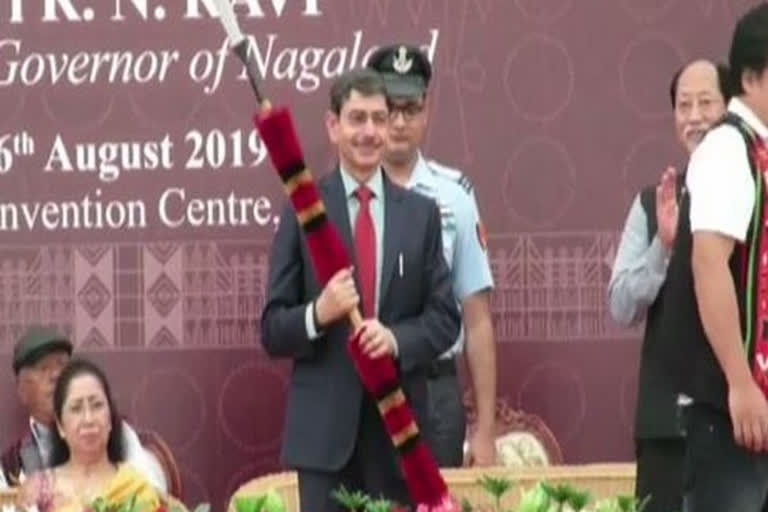New Delhi: Nagaland governor R N Ravi’s stinging letter to Chief Minister Neiphiu Rio specifying his intent to exercise certain powers conferred upon the gubernatorial post comes as no surprise given the existing situation in the border state.
The governor has sought total powers to appoint senior government officials with the justification that the law and order has collapsed in Nagaland due to large-scale extortion and illegal activity by ‘armed gangs’,
The letter has evoked diverse reactions from different quarters and parties. The Isak-Muivah faction of National Socialist Council of Nagalim (NSCN-IM), the biggest insurgent outfit active in the Naga inhabited areas of the Northeast, replied saying that it only levies “legitimate taxes.” Other groups said that it they only seek “contributions.”
The governor mentioned in the letter that there were “over half-a-dozen organised armed gangs” that impose taxes in the hill state. Most of these groups are factions of the undivided NSCN that was formed in 1980 by leaders opposed to the Shillong Accord (1975).
As a matter of fact, rebel groups have been running a parallel government in Nagaland and Myanmar’s Naga region for the past several decades. Commercial establishments are often issued receipts of the taxes paid which are collected either by functionaries of the groups or by middlemen.
But what prompted Governor R N Ravi to write the letter to the chief minister at this juncture?
Impact of COVID-19?
Many residents of Nagaland feel that the levying of ‘taxes’ by the rebel groups on the trucks plying their goods on the highways have increased in the past three months. Some people suspected to have been involved in such activities have also been apprehended by the police in the past few weeks.
The expenses of all these outfits in Nagaland had soared following more recruitment last year when speculation was rife that the government would soon ink the accord.There was hope that the cadres would gain entry into the new battalions in the police and army’s Naga Regiment.
The outfits wanted to expand their ranks to avail all the benefits from the government. This is a phenomenon that had been noticed earlier with other militant outfits in the region whenever an accord was clinched with the government. In 1992, fake lists were created by the Assam government that included surrendered ULFA functionaries and people who were not associated with the rebel outfit.
Also read:Nagaland grapples with daily spike in COVID-19 cases
On 25 November last year, the media reported that a combined squad of the Assam Rifles and army thwarted a covert recruitment drive by the NSCN(IM) in Nagaland’s Mon district. But this was only one instance of similar episodes that the other groups had also orchestrated which had become an open secret.
Secondly, the bulk of these groups’ income comes from the taxes levied on business establishments and shops in the commercial hub of Dimapur. Hong Kong market in the town which mostly sells smuggled Chinese goods has remained shut since March. As is the case all over the country, COVID-19 has adversely impacted business all over the state which also resulted in lower collections by the outfits.
So the only option for the groups has been to fall back on the hundreds of trucks carrying goods through the state every day to different destinations that include Manipur as well. No wonder, there has been a sharp price rise of all essential commodities in Nagaland in the past four months or so.
What Is The Way Out?
There cannot be a military solution to the decades old conflict in Nagaland. The BJP leadership will have to understand that the strategy which has been implemented in Jammu & Kashmir may fail to produce results in the Northeast.
The peace process in Nagaland began in 1997 when the NSCN(IM) came over ground following a ceasefire agreement with the government which was followed by a similar pact with NSCN(Khaplang) years later. Later, other outfits were also engaged in the peace process to ensure that an agreement does not create further strife in the disturbed state as it happened during the Shillong Accord.
Almost all the issues between the government and the rebel groups (also called Naga National Political Groups) have been resolved except the flag and the constitution. Some of these groups led by the NSCN(IM) have been steadfastly clinging to these demands which the government is not willing to accept.
Also read:Nagaland Guv wants total power to 'transfer, post' senior bureaucrats, police officers
Many senior citizens and civil society groups in Nagaland are opposed to the conduct of the militant outfits but the issues raised by them have wide support.
Rosemary Dzuvichu, adviser to Naga Mothers’ Associations, said that such instances would continue to occur if the negotiations remain unresolved. “The Central government must be serious in bringing the prolonged peace talks to a settlement and resolve the Naga political issue.”
Bringing the peace process in Nagaland and other states in the Northeast to a logical conclusion also makes sense since the Centre has firmed up ambitious plans for the region that include implementation of the Act East Policy. Nagaland also assumes importance since connectivity with Myanmar would be feasible only through Manipur and not Mizoram given the existing situations in the adjoining regions in Myanmar.
(Written by Rajeev Bhattacharyya, Senior Journalist)
